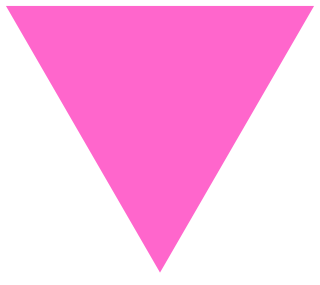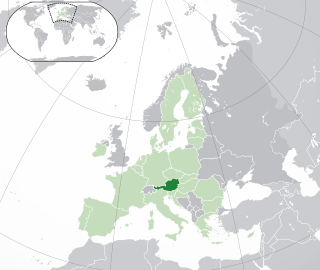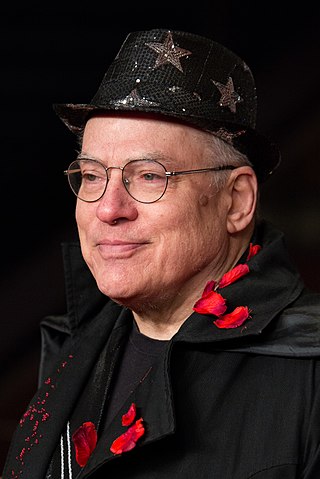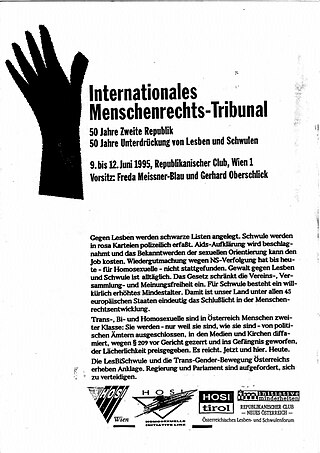
Rosa Lila Villa is an Austrian LGBT center situated in the Linke Wienzeile Buildings neighbourhood of Vienna. It is designed as a housing project, restaurant, event and counseling venue for LGBT people in Austria.

Rosa Lila Villa is an Austrian LGBT center situated in the Linke Wienzeile Buildings neighbourhood of Vienna. It is designed as a housing project, restaurant, event and counseling venue for LGBT people in Austria.
The initiative to found the Villa comes from the squatter scene of the late 1970s and 80s and from the early lesbian and gay movement. [1] The house, which was scheduled for demolition, was squatted in 1982. After long negotiations with the owner and the deputy mayor of Vienna Gertrude Fröhlich-Sandner, who supported the project, a contract was signed in 1984 for a 30-year lease, [1] even though homosexuality was still illegal in the country. [2]
The building was renovated with one part dedicated to a center for counseling homosexual and transgender people, and one part to communal apartments and catering. [3] The organization behind the Rosa Lila Villa worked on LGBT rights in Austria, among other things by working on education about HIV/AIDS. [4]
In 2016, the organisation opened a spin-off in the house that focused on LGBTIQ refugees, named Queer Base. [5] On the same year, the house was vandalized with a graffiti that said "Kill gays" (Tötet Schwule). [5] In 2017, queer Base received the Bruno Kreisky Prize for Services to Human Rights and the Alexander Friedmann Prize. [6] [7]
In 2019, the restaurant was renamed to Villa Vida. The Villa is divided between the Lila Tip for lesbian counseling and the Türkis Rosa Tippp for transgender, gay and queer counseling. [3]

Lesbian, gay, bisexual, and transgender (LGBT) movements are social movements that advocate for LGBT people in society. Although there is not a primary or an overarching central organization that represents all LGBT people and their interests, numerous LGBT rights organizations are active worldwide. The first organization to promote LGBT rights was the Scientific-Humanitarian Committee, founded in 1897 in Berlin.

A pink triangle has been a symbol for the LGBT community, initially intended as a badge of shame, but later reappropriated as a positive symbol of self-identity. In Nazi Germany in the 1930s and 1940s, it began as one of the Nazi concentration camp badges, distinguishing those imprisoned because they had been identified by authorities as gay men or trans women. In the 1970s, it was revived as a symbol of protest against homophobia, and has since been adopted by the larger LGBT community as a popular symbol of LGBT pride and the LGBT movements and queer liberation movements.
"New queer cinema" is a term first coined by the academic B. Ruby Rich in Sight & Sound magazine in 1992 to define and describe a movement in queer-themed independent filmmaking in the early 1990s.

Lesbian, gay, bisexual, and transgender (LGBT) rights in Germany rank among the highest in the world; having evolved significantly over the course of the last decades. During the 1920s and the early 1930s, lesbian and gay people in Berlin were generally tolerated by society and many bars and clubs specifically pertaining to gay men were opened. Although same-sex sexual activity between men was already made illegal under Paragraph 175 by the German Empire in 1871, Nazi Germany extended these laws during World War II, which resulted in the persecution and deaths of thousands of homosexual citizens. The Nazi extensions were repealed in 1960 and same-sex sexual activity between men was decriminalized in both East and West Germany in 1968 and 1969, respectively.

Lesbian, gay, bisexual, and transgender (LGBT) rights in Austria have advanced significantly in the 21st century, and are now considered generally progressive. Both male and female forms of same-sex sexual activity are legal in Austria. Registered partnerships were introduced in 2010, giving same-sex couples some of the rights of marriage. Stepchild adoption was legalised in 2013, while full joint adoption was legalised by the Constitutional Court of Austria in 2016. On 5 December 2017, the Austrian Constitutional Court decided to legalise same-sex marriage, and the ruling went into effect on 1 January 2019.
Over the course of its history, the LGBT community has adopted certain symbols for self-identification to demonstrate unity, pride, shared values, and allegiance to one another. These symbols communicate ideas, concepts, and identity both within their communities and to mainstream culture. The two symbols most recognized internationally are the pink triangle and the rainbow flag.

LGBT themes in horror fiction refers to sexuality in horror fiction that can often focus on LGBTQ+ characters and themes within various forms of media. It may deal with characters who are coded as or who are openly LGBTQ+, or it may deal with themes or plots that are specific to gender and sexual minorities.

Holger Bernhard Bruno Mischwitzky, known professionally as Rosa von Praunheim, is a German film director, author, painter and one of the most famous gay rights activists in the German-speaking world. In over 50 years, von Praunheim has made more than 150 films. His works influenced the development of LGBTQ+ rights movements worldwide.

LGBT movements in the United States comprise an interwoven history of lesbian, gay, bisexual, transgender and allied social movements in the United States of America, beginning in the early 20th century. A commonly stated goal among these movements is social equality for LGBT people. Some have also focused on building LGBT communities or worked towards liberation for the broader society from biphobia, homophobia, and transphobia. LGBT movements organized today are made up of a wide range of political activism and cultural activity, including lobbying, street marches, social groups, media, art, and research. Sociologist Mary Bernstein writes: "For the lesbian and gay movement, then, cultural goals include challenging dominant constructions of masculinity and femininity, homophobia, and the primacy of the gendered heterosexual nuclear family (heteronormativity). Political goals include changing laws and policies in order to gain new rights, benefits, and protections from harm." Bernstein emphasizes that activists seek both types of goals in both the civil and political spheres.
Lesbian, gay, bisexual, transgender (LGBT) affirming denominations in Judaism are Jewish religious groups that welcome LGBT members and do not consider homosexuality to be a sin. They include both entire Jewish denominations, as well as individual synagogues. Some are composed mainly of non-LGBT members and also have specific programs to welcome LGBT people, while others are composed mainly of LGBT members.
Gay media refers to media that predominantly targets a gay, lesbian or LGBTQ+ allied audience. The primary target market for gay media may also more broadly be considered to include members of an LGBTQ+ community. Secondary targets are LGBTQ+ allies, and in some instances those who oppose gay rights may be targeted as a form of activism to change their minds. There are many types of gay media, and the type is determined by the purpose of the media presented. Gay or queer media can also be defined as web sites, films, magazines and other cultural products that were created by queer individuals, or groups that are typically out, meaning that they are public or open about their identity. Gay creators do not always include gay themes or issues in their productions but there is usually at least subtle references to queerness or acceptance in these media.

The International Human Rights Tribunal (IHRT) was a symbolic tribunal which took place in Vienna, Austria, in June 1995. It was chaired by environmental and human rights activist Freda Meissner-Blau and Gerhard Oberschlick, editor of FORVM, and was dedicated to the persecution of lesbians, gays, bisexuals and transgender persons in Austria from 1945 to 1995.
The modern South Korean LGBT rights movement arose in the 1990s, with several small organizations seeking to combat sexual orientation and gender identity discrimination.

Discrimination against gay men, sometimes called gayphobia, is a form of homophobic prejudice, hatred, or bias specifically directed toward gay men, male homosexuality, or men who are perceived to be gay. This discrimination is closely related to femmephobia, which is the dislike of, or hostility toward, individuals who present as feminine, including gay and effeminate men.
LGBT migration is the movement of lesbian, gay, bisexual and transgender (LGBT) people around the world or within one country. LGBT individuals choose to migrate so as to escape discrimination, bad treatment and negative attitudes due to their sexuality, including homophobia and transphobia. These people are inclined to be marginalized and face socio-economic challenges in their home countries. Globally and domestically, many LGBT people attempt to leave discriminatory regions in search of more tolerant ones.

The following outline offers an overview and guide to LGBT topics:
The following is a timeline of lesbian, gay, bisexual, transgender and queer (LGBTQ) journalism history.
Vienna, the capital of Austria, has an active LGBTQIA+ community. Vienna is considered Austria's queer capital, with several LGBTQIA+ spaces, organisations and a history of LGBTQIA+ activism going back to the late 19th century.